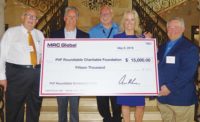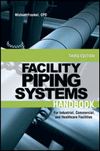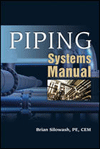You most certainly can’t accuse the PHCP-PVF industry of sitting on its hands when it comes to trying to solve the current job shortage sweeping through the supply chain.
Last month I told you about a meeting American Supply Association members and other plumbing industry executives had in the White House with administration officials on that very topic. I encourage you to check out my interview with ASA CEO Mike Adelizzi in this month’s issue that dives deeper into the talent shortage and what was proposed during that meeting, specifically the introduction of plumbing vocational training in high schools.
Another industry member making a difference on the labor-shortage front is Kevin Rosenthal, executive director of business development at Rahway, N.J.-based industrial PVF distributor A&M Industrial. Rosenthal advocates more industry executives getting involved in the education of the next generation of workers via academia.
In late November, Rosenthal made his third appearance at Rutgers University in Newark, N.J., where he taught two graduate-level supply-chain classes. Rosenthal presented a case study on a real-life integrated supply program, plus talked about emergency response best practices and supply-chain resiliency.
Previously, Rosenthal was asked to be on an expert panel at Rutgers on supply-chain disruption and returned to do a joint presentation with a local power company talking about disaster/catastrophic event management.
“This industry continually needs good people,” he says. “When an opportunity like this (such as presenting at Rutgers) comes up, you have to seize it and drive home the fact this is an exciting and fun industry. We need fresh approaches, fresh points of view and new ways of thinking. What we did yesterday is inadequate today and what we do today will be inadequate tomorrow because of advances in technology. We aren’t playing checkers in this industry. We’re playing chess where we have to be two to three moves ahead.
“As an industry, we should look at these types of situations as a great opportunity to get in front of people who are studying our business. It allows us to raise the awareness of the industry through academia. Any opportunity we get as a company or I get personally to share any knowledge or insight I have, especially anybody currently in the field or studying to enter the field, can potentially have an impact on the next generation. This is where the rubber meets the road between our industry and academia. We need to take a more active role.”
Rosenthal, who lauds the Houston-based PVF Roundtable for its efforts with its scholarship program that both universities and technical schools benefit from, likens the industry-academia connection to professional baseball’s minor-league system.
“These are our farm teams,” he says. “There are talented people out there who want to learn. What they lack is the practical experience. We can help them better understand what that is, work with them and fill in some of those gray areas academia doesn’t touch on. We can go in there and give real-world live examples and connect those dots. If we can position ourselves as an industry to have a positive effect on the next group of leaders I think it’s an opportunity we cannot afford to miss because it potentially has positive ramifications and effects for all of us.”
Rosenthal also brings up a good point about the country-wide reach of the distribution industry as it pertains to recruitment. “Just because a guy graduates from Rutgers doesn’t mean he’s going to work in New Jersey,” he says.
At the company level, Rosenthal notes A&M has benefitted from the education it has received from the likes of ASA and the AD buying group it belongs to. And now, he says, it’s time to take that knowledge and put it into the hands of those preparing to enter the supply chain.
“Succession planning in our industry is not where it should be,” he says. “There is a tremendous drop-off, especially in the technological knowledge realm. There has to be a better vehicle for that knowledge transfer from folks retiring to people coming into the industry. Getting involved in academia has positive and long-ranging benefits for the industry by helping develop qualified and well-schooled professionals. Twenty-five years ago there was no such thing as a supply-chain degree. Education now is a big part of this equation.”
And thanks to the proactivity of many, including Rosenthal, this industry is on its way to solving that equation.
This article was originally titled “The case for academia” in the December 2017 print edition of Supply House Times.










